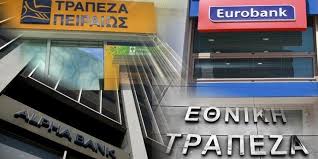
Moody's Investors Service expects enhancement in the funding in Banks in Greece and the asset risk during the next one to one and half years which formed the basis for the ratings agency to change its outlook on the country’s banking system from stable to positive.
A report from the agency said that it anticipates that the Greek economy would be able to maintain the forward momentum during the aforesaid outlook period if there is enough focus by the government on continued structural reforms for inducing foreign investments. The report was focused on the credit sector of the EU country as well as the non-performing loans of the banks in the country.
The report from the ratings agency was commensurate with most predictions from most Greek and European authorities and observers about a 2 per cent growth in Greek economy for the current year and a 2.2 per cent growth next year driven by strong demand in exports and services – tourism in particular.
Bad loans would remain high according to estimate of Moody's but also expects that the Greek banks would also most probably be able to meet the targets that have been committed to the eurozone regulator in relation to reduction of their non-performing exposures (NPEs) to about 35 per cent of total loans till the end of 2019. The ratings agency also argued that the banks are progressing "amid an improving, but still challenging operating environment".
"Problem loans will gradually decline from very high levels as Greek banks benefit from improved loan recovery laws," Nondas Nicolaides, a Vice President and Senior Credit Officer at Moody's, said.
Earlier this month, another ratings agency Standard & Poor also upgraded the outlook of Greek banks by a notch and maintained a stable outlook.
comfortable regulatory capital levels are possessed by Greek banks, noted the Moody's report. It further noted a common equity Tier 1 (CET1) ratio for the system of around 15.8 per cent in March 2018. However, the quality of such capital is undermined by sizable Deferred Tax Assets (DTAs).
There is a declining trend among Greek banks of depending on funding form the central bank funding and emergency liquidity assistance (ELA). The agency also expects that in the coming months, the banks would likely be able to completely eliminate ELA because the banks are regaining access to the interbank repo and covered bond markets. Moody's also noted that deposits are gradually increasing with the banks. The low credit and operating costs would also help most of the Greek the banks to likely remain marginally profitable through 2019, highlighted the report.
However, Moody's noted that there would likely remain a pressure on the net interest margins of the banks because the banks continue to deleverage and run down their loan balances by the process of write-offs and sales of NPEs.
(Source:www.xinhuanet.com)
A report from the agency said that it anticipates that the Greek economy would be able to maintain the forward momentum during the aforesaid outlook period if there is enough focus by the government on continued structural reforms for inducing foreign investments. The report was focused on the credit sector of the EU country as well as the non-performing loans of the banks in the country.
The report from the ratings agency was commensurate with most predictions from most Greek and European authorities and observers about a 2 per cent growth in Greek economy for the current year and a 2.2 per cent growth next year driven by strong demand in exports and services – tourism in particular.
Bad loans would remain high according to estimate of Moody's but also expects that the Greek banks would also most probably be able to meet the targets that have been committed to the eurozone regulator in relation to reduction of their non-performing exposures (NPEs) to about 35 per cent of total loans till the end of 2019. The ratings agency also argued that the banks are progressing "amid an improving, but still challenging operating environment".
"Problem loans will gradually decline from very high levels as Greek banks benefit from improved loan recovery laws," Nondas Nicolaides, a Vice President and Senior Credit Officer at Moody's, said.
Earlier this month, another ratings agency Standard & Poor also upgraded the outlook of Greek banks by a notch and maintained a stable outlook.
comfortable regulatory capital levels are possessed by Greek banks, noted the Moody's report. It further noted a common equity Tier 1 (CET1) ratio for the system of around 15.8 per cent in March 2018. However, the quality of such capital is undermined by sizable Deferred Tax Assets (DTAs).
There is a declining trend among Greek banks of depending on funding form the central bank funding and emergency liquidity assistance (ELA). The agency also expects that in the coming months, the banks would likely be able to completely eliminate ELA because the banks are regaining access to the interbank repo and covered bond markets. Moody's also noted that deposits are gradually increasing with the banks. The low credit and operating costs would also help most of the Greek the banks to likely remain marginally profitable through 2019, highlighted the report.
However, Moody's noted that there would likely remain a pressure on the net interest margins of the banks because the banks continue to deleverage and run down their loan balances by the process of write-offs and sales of NPEs.
(Source:www.xinhuanet.com)














